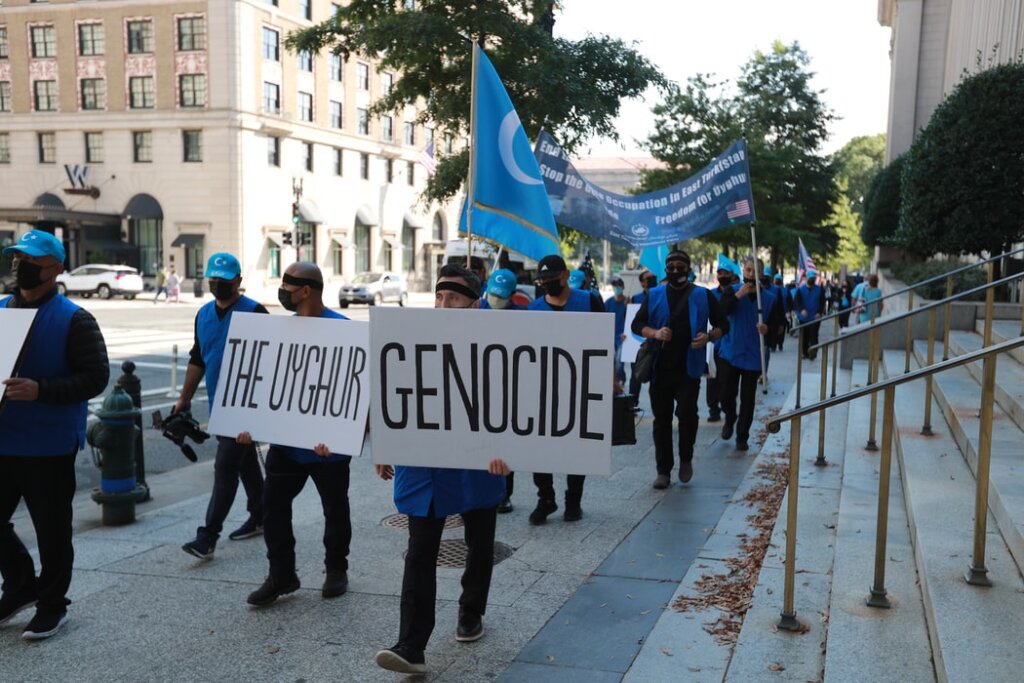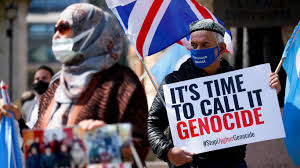House of Lords Library Briefing On Next Thursday’s Debate on Bringing The Perpetrators of Genocide To Justice. Background posts on Uyghurs in Xinjiang, Rohingya in Burma, Tigray, Nigeria, Yezidis, and Armenians.

https://lordslibrary.parliament.uk/genocide-bringing-perpetrators-to-justice/
On 27 May 2021, Lord Alton of Liverpool (Crossbench) is due to ask Her Majesty’s Government what steps it is taking to bring the perpetrators of genocide to justice.
What is genocide?
Genocide refers to any of the following acts that are committed with the intent to destroy a national, ethnical, racial or religious group:
- killing members of the group;
- causing serious bodily or mental harm to members of the group;
- deliberately inflicting on the group conditions of life calculated to bring about its physical destruction in whole or in part;
- imposing measures intended to prevent births within the group; or
- forcibly transferring children of the group to another group.
The Convention on the Prevention and Punishment of the Crime of Genocide (the genocide convention) provides this definition. The crime can be committed in both a time of peace and in time of war. Examples of genocide include genocide under the Nazis (the Holocaust) and more recently the genocide in Darfur.
The genocide convention was the first piece of international law to codify the crime of genocide. It was initially approved in 1948 and came into force in 1951. It places an obligation on signatories to take measures to prevent and punish genocide, including enacting relevant legislation and punishing perpetrators. As of July 2019, the convention had been ratified or acceded to by 152 states. The UK acceded to the convention in 1970.
What other international agreements on genocide has the UK signed?
There are several other agreements to prevent genocide that the UK is a signatory to. Agreements include: the Rome Statute of the International Criminal Court; the responsibility to protect principle; and the Accountability, Coherence and Transparency Group’s Code of Conduct.
Rome Statute of the International Criminal Court
The UK ratified the Rome Statute of the International Criminal Court on 4 October 2001. This statute established the International Criminal Court (ICC). The ICC investigates and tries individuals charged with crimes of concern to the international community, including genocide.
In 2001, the UK enacted the International Criminal Court Act 2001. This incorporated ICC crimes (such as genocide) into domestic legislation.
Responsibility to protect principle
As part of the United Nations (UN), the UK adopted the principle of ‘responsibility to protect’ (R2P) at a UN world summit meeting in 2005. This principle placed a legal obligation on member states to protect their populations from atrocity crimes such as genocide. The R2P principle has three pillars:
- the responsibility of each state to protect its populations;
- the responsibility of the international community to assist states in protecting their populations; and
- the responsibility of the international community to protect when a state is manifestly failing to protect its populations.
The Government reaffirmed its commitment to R2P in a response to the House of Commons Foreign Affairs Committee report on ‘Global Britain: Responsibility to Protect and Humanitarian Intervention’ in 2018.
Accountability, Coherence and Transparency Group’s Code of Conduct
In a speech made by the then UK Permanent Representative to the UN in 2015, Matthew Rycroft confirmed that the UK would sign up to the Accountability, Coherence and Transparency (Act) Group’s Code of Conduct (the code). The code requires members of the UN Security Council (the council) not to vote against any credible resolution that aims to prevent or halt atrocity crimes such as genocide.
The five permanent members of the council have a special right to veto any resolution. If used, the respective resolution is deemed not approved. The five permanent members are the UK, the USA, China, France and Russia. Permanent members were given the power of veto because of their key roles in the establishment of the UN.
The code was developed by the Act group—a group of 27 states who are responsible for improving the working methods of the council—in response to concerns about the frequency of permanent council members using their power of veto in situations where atrocities either occurred or were at risk of occurring.
A complete list of vetoes is included in the Security Council report. The last UK veto of a council resolution occurred in 1989.
Recent parliamentary discussion during the Trade Bill
During the bill proceedings of the Trade Act 2021, several amendments were moved that aimed to ensure judicial oversight of trade agreements with countries accused of genocide. The treatment of Uyghur Muslims in China was referred to several times during the debates.
For instance, an amendment moved by Lord Alton of Liverpool (Crossbench) during the bill’s report stage debate in the House of Lords aimed to enable the High Court of England and Wales to determine that an international trade agreement should be revoked if a signatory country has committed genocide.
The amendment received cross-party support and was inserted into the bill in the House of Lords. The amendment also received support from external organisations such as the International Bar Association’s Human Rights Institute and the Board of Deputies of British Jews.
However, following Government concerns about the amendment’s potential to limit government prerogative powers to conduct international trade relations, it was removed during the House of Commons consideration of Lords amendments debate on 19 January 2021.
Several iterations of the amendment were moved during subsequent debates, but did not form part of the final Trade Act 2021. Instead, a compromise amendment was agreed to. This enables a House of Commons committee to identify credible reports of genocide and insist on a parliamentary debate if the committee is not satisfied with the Government’s response to its report.
More information on the amendments in the House of Lords can be found in the House of Commons Library briefing: Trade Bill 2019‒21: Lords Amendments.
Read more
- UK Parliament, ‘Trade Act 2021’, accessed 19 May 2021
- Cristina Gallardo, ‘UK lawmakers declare China’s treatment of Uyghurs ‘genocide’’, Politico EU, 22 April 2021
=========================
On Monday last I chaired a Webinar which included the contribution of Professor Mukesh Kamila CBE a former UK and UN official, and leading authority on genocide, who was recently reported in the Daily Telegraph as saying events in Tigray constitute genocide. https://www.davidalton.net/2021/05/17/a-recording-of-todays-webinar-on-tigray-will-be-made-available-here-is-the-urgent-appeal-which-david-alton-made-to-dominic-raab-to-table-a-resolution-at-the-un-security-council/
See the following Background Posts
https://www.davidalton.net/2019/12/22/here-are-a-selection-of-posts-from-2019-to-provide-a-recap-of-the-year-through-a-different-lens-and-a-distraction-when-the-festivities-prove-too-much-the-year-begins-and-end/


